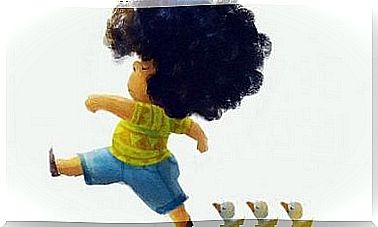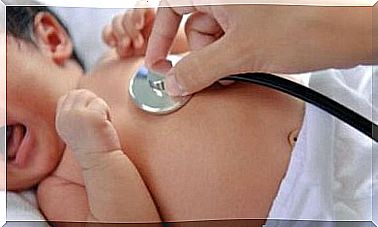When Children Get Angry At The Smallest Occasion

When children get angry about anything and everything , it is often a sign of deeper problems. Therefore, it is very important that you give them special care and attention and help them cope with these problems. In today’s article, we’re going to dig deeper into this topic.
Anger
Anger is one of the 8 emotions that are referred to in psychology as the basic emotions of people. These include joy, trust, fear, surprise, sadness, anticipation, disgust and anger. The last emotion arises when someone disagrees or is dissatisfied with a certain situation.
When these emotions occur in children, the little ones usually experience them very intensely. Basically, it doesn’t matter if children are angry or feel angry . However , a problem can arise if the behavior that arouses this anger becomes harmful or occurs very frequently.
Children who get angry at the slightest occasion
If we take a moment to think carefully about what happened just before the child broke out, we can often identify the reasons why the child became angry. An unexpected response, an unfulfilled wish, lack of attention or affection, envy and jealousy, etc. All of these can be triggers for a child to become angry.

It is very important to pay special attention to these cases because permanent anger is neither normal nor healthy. Therefore, as parents, we have to start by carefully analyzing the personal situation of our child.
Whether we do this alone or with the help of a therapist depends on the individual case. It is important that this close observation and analysis of the situation will help us to identify the causes that are causing this frustrated reaction in our child.
What causes can children get angry all the time?
There are several possible causes for permanent feelings of anger:
- A current stressful situation : the birth of a sibling, a divorce, the start of the new school year, school pressure to perform, etc.
- A situation in which permanent (and often normalized) physical or psychological abuse occurs. These experiences lead to two different reactions in children: learned defenselessness or attack. In the second case, this is how children express the anger that develops in them as a result of the abuse. In addition, it can happen that they react equally to any situation that they perceive as threatening.
- Abusive or stressful situations that the mother experienced during pregnancy or in the early years of raising children. These experiences lead to emotional numbness and automatic loss of confidence in children. As a result, these children tend to hit each other or get violent in situations they find threatening and hostile.
- Frustration and anger patterns in the family. Children learn by imitating the behavior of those around them. When their role models in the family act angry and frustrated, the children learn how to act as well. They also show this behavior in all other situations in which they feel uncomfortable.
- Other factors.
It is very important for the well-being of these children that adults identify the reasons and causes that lead to the children’s intense anger. And then, of course, it is imperative to take measures to correct these causes and improve the situation.
How can you help your child if they get angry all the time?
In order to take effective action in these cases, it is important that all of the children’s communities work together. This applies particularly to the family and school. Both parties need to work together and coordinate various measures and strategies to help the child cope with his or her problem. The following procedure is therefore usually recommended:

- Calm and respectful behavior. Through this behavior you can show your children that there are alternative ways to deal with difficult situations. If you get angry yourself, you will only add to your child’s anger.
- In addition, you should show interest in your child and his or her feelings. Listen to how your child interprets the situation. This will give you a better understanding of your child’s behavior and its causes. You will also receive valuable information on how you can best support and accompany your child.
- Show your child healthier and more respectful ways to react and encourage them to act on them. For example, teach him breathing and relaxation techniques. In addition, you and your child can choose an object on which they can vent their anger. It can also be helpful to read stories with your child that deal with this topic.
- Set and communicate clear boundaries. Basically, when children express their anger, that’s fine. However, it is unacceptable for them to harm others or destroy other people’s property.
What else can you do
- Increase the children’s emotional self-esteem. If children can react without getting angry, it is very important that you reinforce this behavior in a positive way. Encourage them to watch how they feel about it. Also ask them how they feel when they are angry and ask them to compare these feelings.
- Observe which situations are causing your child to get angry and try to avoid them. If such a situation arises, however, you should remind your child of the alternative behaviors that you have previously practiced. In this way, your child will gradually internalize the new behavior.
- Increase your children’s empathy. When children express their anger by hurting others, it is very important that you teach them empathy. Since these children need to understand how other people feel because of their anger, you can get them to think about it by asking: ” What do you think X is feeling right now?” , “ Do you feel good when you see X this way now?”.
Final thoughts
It is very important that the environment intervenes when children get angry at the slightest cause. This intervention is not only crucial for children to learn to adapt to their environment and to integrate. It also brings peace to families, teachers, and classmates.
You can also prevent your child from having major, long-term problems associated with a lack of emotional and social adaptability.
The right intervention enables children to better deal with their emotions. In addition, they learn to find ways to solve problems that arise satisfactorily and successfully. When they experience frustration, they will no longer automatically react angry. This also has a positive effect on their mental health.









